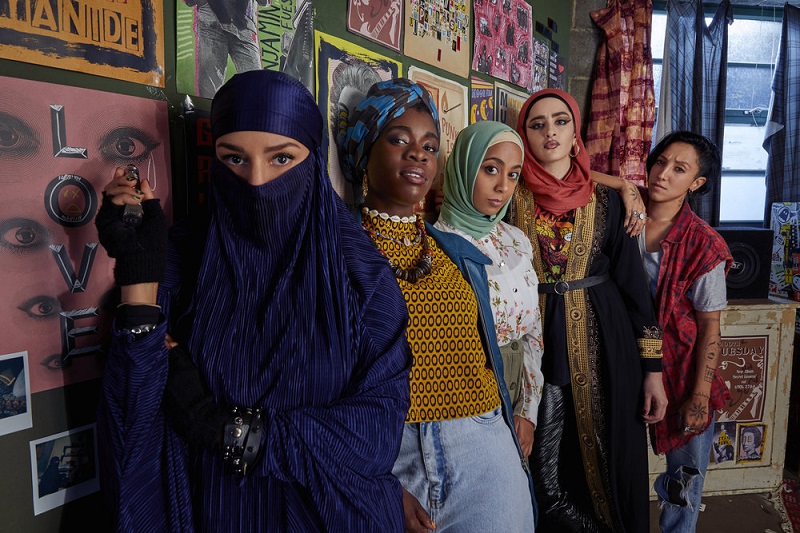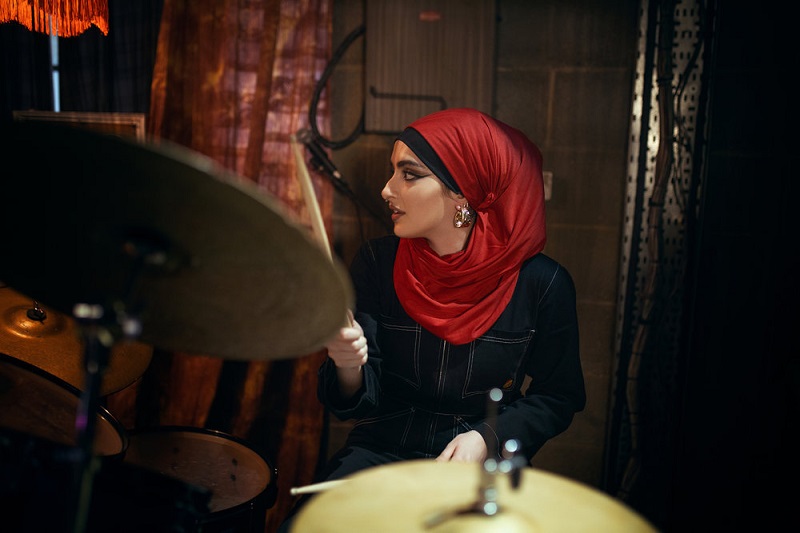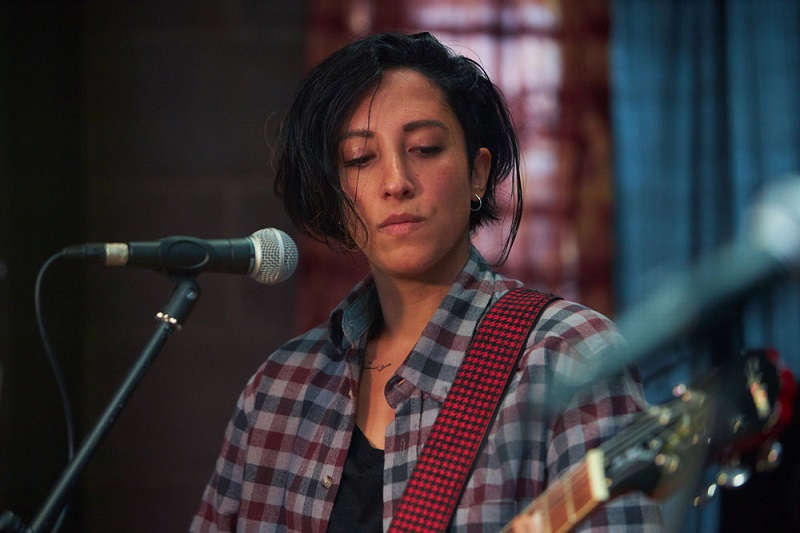A few seconds into We Are Lady Parts, you think you know what the show’s going to be: Amina Hussain (Anjana Vasan), a mousy, hijab-wearing PhD student, sitting across the room from her potential spouse and his parents. But just as the consternation starts to set in — ugh, another arranged marriage story — We Are Lady Parts starts to let you know what kind of show it’s actually going to be.
As Amina fantasizes about her potential spouse, her parents regale him and his parents with the most embarrassing details about Amina’s life: her premenstrual breakouts, her tendency to sweat and her nervy disposition that induces diarrhea and vomiting. And even after the potential suitor and his parents denounce Amina’s music as haram, her father persists in recounting a past performance… and then breaks out in song with Amina’s mother.
Whatever you thought We Are Lady Parts was going to be, this ain’t it. And just in case those first few minutes didn’t make it abundantly clear, the show cuts to band practice for the eponymous all-girl, all-Muslim punk band, and the band’s lead singer shouts, “I’m going to kill my sister!”

Lady Parts is unlike anything you’ve ever seen on television but it’s not without its contemporaries.
Created, written and directed by Nida Manzoor, We Are Lady Parts has the feminist sensibilities of Fleabag while echoing some of Chewing Gum‘s comedic ones. It has Ackley Bridge‘s foregrounding of multiple Muslim characters, so that none have to shoulder the burden of representing an entire community on their own. It parallels Derry Girls in its structure: showcasing five central characters but spending more time with some than others. But, while it shares some of its DNA with other British exports, We Are Lady Parts has its own voice… and it is loud, raucous and unapologetic.
The band channels the ethos of what riot grrrl began — Dickless, Le Tigre and Babes in Toyland all get a shout-out in the show’s first episode — and presents it all through the lens of a racially diverse group of Muslim women. The band’s is driven by its lead singer, Saira (Sarah Kameela Impey). The James Dean-eseque singer/guitar/Halal butcher channels her anger — which lives just beneath her steely veneer — into the Lady Parts’ aggressive sound. She’s supported by Bisma (Faith Omole) on bass and Ayesha (Juliette Motamed) on drums, while Momtaz (Lucie Shorthouse) acts as the band’s manager.
“We’re sisters who pray together, play together, speaking our truth to whoever can be asked to listen,” Saira explains.
Initially, Saira determines that the band’s sound is missing something: a lead guitarist. Lady Parts finds their unlikely new member when Amina shows up at their audition looking for the boy who handed her the band’s flyer. The band extends an offer: a short stint in Lady Parts in exchange for a date with the man she’s lusting after (who happens to be Ayesha’s brother). Amina’s so desperate to find a husband that she readily agrees, despite “a nervy disposition that induces diarrhea and vomiting.” Over six episodes — oh, those cursed abbreviated British seasons — the band begins to forge its identity and, in the process, the band members discover more about themselves.

For most of Lady Parts‘ first series, Ayesha doesn’t seem like the self-discovery type. She’s confident, navigating the world with an enviable swagger. She’s prickly and quick to insult but, in the quiet moments, her callousness recedes. Even as she laments how annoying Amina is — “you do get on my tits though,” Ayesha says — she works behind the scenes to ensure that her brother doesn’t break Amina’s heart. But it’s a band meeting with Zarina Zee, a social media influencer and the culture editor at Yellow Tongue Magazine, that stops Ayesha in her tracks.
Seconds before Ayesha spots Zarina, she’s outside mocking her — ignoring Momtaz’s pleas to behave — but when she sees her, she’s left slack-jawed. It doesn’t even matter that, in that first meeting, Zarina turns out to be every bit the caricature that Ayesha imagined. Suddenly, she’s every bit as romance obsessed as Amina, with Chavela Vargas’ “Paloma Negra” soundtracking her daydream. Her quick wit gives way to stammering. Gone is Ayesha’s confidence. Gone is her swagger. All that’s left is a girl with a crush.
Aside from some heartfelt teasing about her newfound softness, Ayesha’s feelings for are a non-issue within her Lady Parts’ bubble. But when Zarina questions Ayesha about how it feels to be a queer Muslim woman for the article she’s writing about the band, Ayesha clams up and asks Zarina not to go there. Sensing a story, Zarina pushes: first urging Ayesha to be a role model for queer kids, then reminding her that the essence of punk is not caring what people think. But this time — and for what, I imagine, is the first time — Ayesha doesn’t give in and Zarina allows it.
I longed learn more about Ayesha. Why does this ostentatious Muslimah whose style announces her before she can even say a word recoil at the idea of being out? Why is she every bit as desperate for love as Amina? What drives her to play this particular genre of music? And what’s with her weird fascination with Blink-182? We Are Lady Parts frustratingly, leaves a lot about Ayesha unanswered. If you watch Lady Parts solely looking to invest in the queer representation, you may well leave disappointed.
But the strength of We Are Lady Parts doesn’t just lie in its queer representation, it’s in the show’s ability to tell stories that resonate with queer audiences. Amina’s story is, on its face, a story about a woman obsessively searching for a husband. She’s a fixture on the apps, she creates elaborate fantasies about her would-be suitors. But beneath the surface, Amina’s story is one about being caught between expectations of who she should be and her true passions. She, quite literally, hides tributes to her passions in a closet.

Likewise, Saira’s story is, at its core, about finding your chosen family and allowing yourself to be loved by them, after experiencing hurt and disappointment at the hands of your biological family. At one point, she returns to her familial home to discover that it is not longer hers and that time’s passage has made strangers of them all. She glances upon the family pictures on the wall — trying to remember a moment when home felt like a place where she belonged — and her mother interrupts.
“You were my good girl,” she laments to her wayward child. “It was Ruksana that was always getting into trouble. You were my sweet, quiet girl. What happened?”
“Nothing happened,” Saira answers plainly. “I’m just not what you want.”
It’s such a brilliant juxtaposition to the night she spent at Amina’s. Saira enters Amina’s home timidly, expecting the same rejection that she’s experienced at her own home, but she doesn’t find it. Amina’s parents are welcoming. They embrace their daughter’s eccentricities, celebrate them even. Saira’s dumbfounded by the whole thing, as if she had never imagined a world in which supportive parents existed.
We Are Lady Parts‘ debut coincides with a broader conversation about the dearth of Muslim representation on the big screen but it obscures problems on the small screen, where representation still remains paltry, particularly for Muslim women and especially for queer Muslim women. That said, between Ayesha of Lady Parts, Adena El-Amin’s return on The Bold Type, Rahim’s emergence on Love, Victor, it’s been quite the summer for queer Muslims… and I hope that we’re at the start of a real sea change. Hopefully, the success of these shows will expand the types of stories that get told and our capacity to see ourselves in them.
The storylines of We Are Lady Parts echo stories that we’ve told about ourselves. They fill an often undervalued aspect of representation: offering a reminder that inside each of us, is all of us.
We Are Lady Parts is now available for streaming on multiple platforms: All 4 in the UK, Peacock in the US and Stack TV in Canada.



I loved this show and totally agree. I need more Ayesha immediately. Also Saira has to be bi, right?
I really, really hope so, @sylianne.
I see Saira as a closeted lesbian. Perhaps not even aware that she is one. She seems so indifferent to her relationship with her boyfriend. Even when she breaks up with him she can talk to him better after they’ve broken up. Get her talking about Amina though, and she just lights up. Her (now former) boyfriend was jealous.
Yeah! That’s also possible.
I really enjoyed the show (the songs are great and “Voldemort Under My Headscarf” is a JAM), but I spent the whole time waiting for Saira to be queer! I refuse to believe that she
1. does not want to commit to having a boyfriend, 2. is a butcher, and 3. Looks Like That, but is not into girls.
I think I asked my wife if it’s queerbaiting if the character is written straight but just EXUDES dyke swagger. (my wife just laughed at me, haha)
she is not the gay character in the show
Thank you! I found it so distracting that Saira WASN’T queer, it didn’t make any sense
@queergirl Comment award
I absolutely loved this show! I didn’t even mind at all that there was just the one queer main character, and I think this article explains why.
I have forced my partner to watch countless queer shows in the past 3 years, and this one got the most enthusiastic response yet.
I also adored Amina’s parents. And loved that Noor didn’t end up an enemy—that scene where she wished her luck showed their difference and her support.
It really felt like perfection. The difference between their show at the bar and the show in the finale was such an accurate portrayal of the importance of community. It was beautiful to watch.
channel 4 comedies have been on fire lately!! This is a great reminder to watch this again, I loved it so much
I really loved this show for so many reasons. The soundtrack is amazing, the characters are relatable, layered and palpable, the camerawork and layout for the show is perfect and I binged it all in one evening. I also really loved how Amina’s parents were actually the ones encouraging Amina to not just rush into marriage and her mother told her that there’s more to life than boys. Amina doesn’t really want to just settle down, and she knows this, but she wants to be what all her other friends at school are, perfected, disciplined, pious with just a dash of feminism. But Amina’s not like that. She’s way more complex. Momtaz was awesome, she’s like this badass manager strolling around in a burqua vaping weed and giving the finger to colonism and sexism but at the same time she says things like, ‘wearing a burqua makes me feel closer to god.’ Bisma is a really brilliant mother who also doesn’t take anyone’s bullshit, Ayesha is very matter of fact and hardcore and takes her work seriously, but she’s also vulnerable in her own ways. I thought they could have given her more of a storyline. Saira-she’s defiantly queer. Maybe she’s a butch girl who’s also into guys. Which is cool! Not all butch women are only into women, but I feel like it’s defiantly something they should explore in the next season.
So many laugh out loud moments. So many great scenes, so much emotion. I loved practically every second of it. Go watch it! Now!
Agreed 100%! It’s so great <3
Just an FYI, Momtaz wears a niqab not the burqa.
Sorry about that! thank you for correcting me on that!
Also Natalie, I loved this Article, it’s perfect.
This show is wonderful!!
I LOVED watching the show, and you’ve captured it so well that I almost teared up!
Hi , can some kind soul for those of us who cannot watch the show (no UK,US or canadian resident) and are not able to watch via vpn (dont own a computer) please upload it on a video site?
It doesnt have to be with the show title, can just be random numbers as the title and also maybe set for private with pw,so it cannot be traced? Or if not upload it to a video site then mail privately or share it in a cloud?
Or i pay good money for burning it to dvds ( dvds only When from the Uk,due to regionalcode)I would forever be grateful.
i wouldnt share it anywhere , would sign an NDA,no really😁🤫
If its not possible to copy it from the television player, my ex – gf
( who refuses to use vpn for safety reasons,)
uses a free downloadable vlc player to view dvds and also you can watch streamed videos within vlc ,there. There is a red button who record films while its running.
I am also beyond sad i had never had the chance to watch ” The bisexual” The tv series with the wonderful desiree as showrunner.
I would also add this to the most urgent request , maybe even more though than “lady parts,” no most def is the bisexual mostly desired by me to watch.
I also heard from other people a lot of netflix series/films who are streaming in the US arent avaiable in netflix europe/germany. And hulu we also dont have here.
i was watching it here: https://primewire.es/series/we-are-lady-parts-jpxxn/oo91ww4
not sure if it’ll work for u but worth a try!
“We’re sisters who pray together, play together, speaking our truth to whoever can be asked to listen”
Should be “arsed” not “asked”.
Sorry to nitpick. Loved this show.
I thought it was quite sweet that Natalie’s ears translated that into a more polite word, but yes it was definitely “arsed”.
For everyone obsessed, the stream for the 9 to 5 cover includes Saira’s dismissive snarl thing at the top, which is something I think others of us might enjoy as much as I did
I’ve just binged this show, (largely based on this review of it), and googled it for more back story. And AS is the only article I found that spoke on the queerness of it.
And this is one more reason why it is sooooo important to support AS.
HI Natalie, lesbian isnt a dirty word! In an article describing a tv show depicting a girl having romantic feelings for another girl, the representation that would engender, you haven’t used the word LESBIAN. Why do you want to obfuscate what is being shown?
The only reason the reclaimed slur “queer” is used at all in offical lgb health and social literature is so hetero people can colonise the lgb movement. No other group would ever use a reclaimed slur as an actual official name for themselves to other people. It would be insular to the group, in an attempt at ironic empowering. Sometimes it works, sometimes it doesn’t. Depends on the group. I would imagine that for muslims, who are killed or castrated (gender reassignment to you) for being gay, would likely have an even more negative reaction to being called “QUEER”.
But whatever a groups reason for using a slur against them amongst themselves…its not for others. Stop teaching straight people to be even bigger bigots.
This article is very intriguing and I absolutely respect your views on Ayesha’s character. I do agree that we need to see more of her arc, but I also believe how her Queer identity is presented in the show and her vulnerability to romance is a true sentiment to who she is.
I believe that Ayesha already represents a lot of Queer Muslim who have the inner conflicts about their faith and orientation. For many people, they find comfort in keeping it to themselves, and not be out. Ayesha respects that intimacy for herself, and as someone who is very blunt, hot-headed, and not really into the idea of making new connections, wanting to keep that part of herself extremely personal is valid. Being out is not a black and white thing for many people, nor is their queerness something that occupies their day to day lives/a focal point of their identity.
That the short-lived moment is a perfect representation of how much she wants people to know about that side of her, and we as the audience could be considered as the public she’d rather not be out to.
P.S: I know a lot of people would love to see more shows featuring LGBQ+ relationships, and for those who specifically look for Queer Muslim content, I would highly recommend Ackley Bridge as it captures the complexity of being a lesbian (and gay) in a predominantly British Muslim community as well as being in complicated relationships, such as unrequited love, forbidden love and even criminal behaviour lmaoooooo